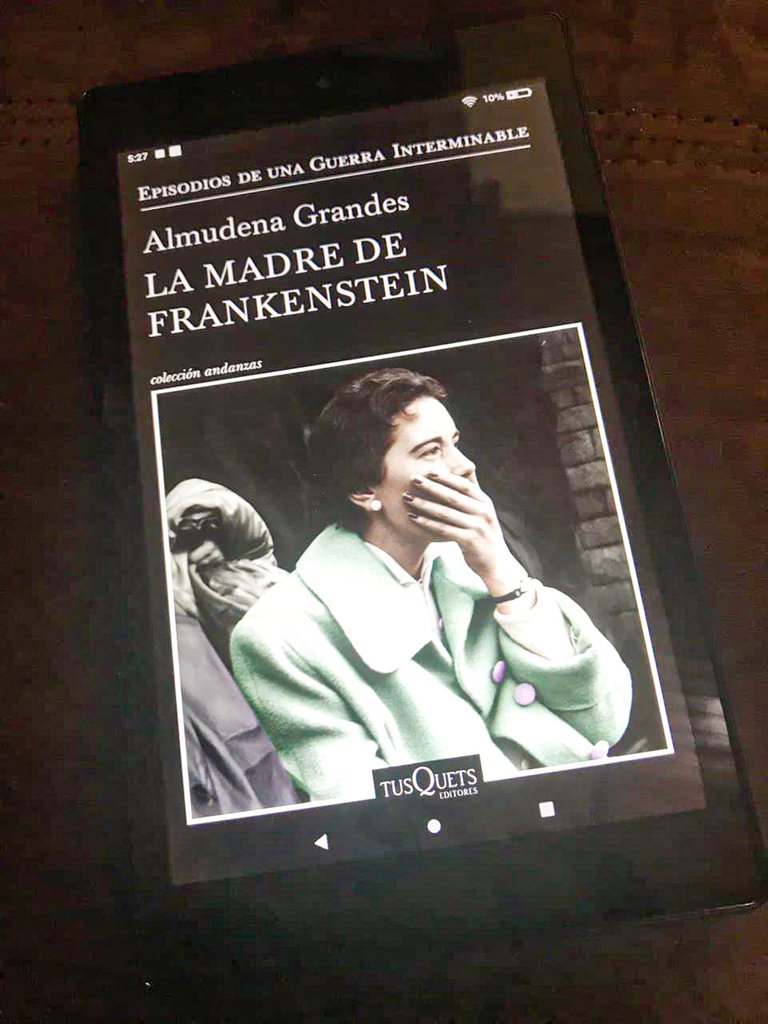

The mother of Frankenstein
La madre de Frankenstein
This is the fifth installment of a series that the author, Almudena Grandes, called episodes of an endless war. The mother of Frankenstein takes us back to the post-war period in Spain in the middle of the last century. The era of Francoism, a fascist dictatorship where there was no room for freedom of thought or opinion. An era marked by misery, exile, death.
Se trata de la quinta entrega de una serie que la autora, Almudena Grandes, denominó episodios de una guerra sin fin. La madre de Frankenstein nos remonta a la época posguerra en España a mediados del siglo pasado. La era del franquismo, una dictadura fascista donde no tenía cabida la libertad de pensamiento, ni de opinión. Una era marcada por la miseria, el exilio, la muerte.


After fleeing Spain as a teenager, a prominent psychiatrist is invited to return to his homeland to test an experimental drug that could help mentally ill people with schizophrenia.
Tras huir de España cuando era un adolescente, un destacado psiquiatra es invitado a regresar a su tierra natal para probar un fármaco experimental que podría ayudar a los enfermos mentales con esquizofrenia.
Upon his return, he is assigned to work in the women's asylum in Ciempozuelos. At that time, being mentally ill was like a curse, and being a woman, even more so. There, he learns that one of the inmates is a woman he met fleetingly in his adolescence, and whose story awakened his frantic interest in psychiatry. That woman, a cultured and intelligent woman, a member of high society, but paranoid, had murdered her own daughter, convinced that she was saving her from an immoral world full of perversion.
A su regreso, es asignado a trabajar en el manicomio de mujeres de Ciempozuelos. Para esa época ser un enfermo mental era como una maldición, y siendo mujer, aún más. En ese lugar, se entera que una de las internas es una mujer que conoció fugazmente en su adolescencia, y cuya historia despertó su frenético interés por la psiquiatría. Aquella mujer, una mujer culta e inteligente, miembro de la alta sociedad, pero paranoica, había asesinado a su propia hija, convencida de que la estaba salvando de un mundo inmoral y lleno de perversión.
In the same place, the doctor meets a young nursing assistant, for whom he feels a special interest given her relationship with the woman who was convicted for the murder of her own daughter.
En ese mismo lugar, el doctor conoce a una joven auxiliar de enfermería, por quien siente un especial interés dada la relación de ésta con aquella mujer que fue condenada por el homicidio de su propia hija.
For the psychiatrist, the story of that self-confessed murderer is fascinating, the reasons she argued for having committed her crime, her justification for it. Her attempt to improve her race, her species, to create a superior being. Just as he is also captivated by the story behind that young woman who attracts him, a past that may or may not resemble his own. Cracks of a regime in which all are immersed and of which all are victims.
Para el psiquiatra, resulta fascinante la historia de aquella asesina confesa, las razones que ella argumentaba para haber cometido su crimen, su justificación ante aquel hecho. Su intento por mejorar su raza, su especie, crear un ser superior. Así como también el se ve prendado de la historia detrás de aquella joven que le atrae, un pasado que puede o no parecerse al de él. Grietas de un régimen en el que todos se ven inmersos y del que todos son víctimas.

These 3 characters are the central axis of this novel that tells a story marked by the prejudices of a time when social classism reigned, the persecution of free thought, poverty, hunger, desolation, and of course, the imposition of religious doctrines to judge and sentence sins ...a time of moral misery.
Estos 3 personajes son el eje central de esta novela que relata una historia marcada por los prejuicios de una época en la que reinaba el clasismo social, la persecusión del pensamiento libre, la pobreza, el hambre, la desolación, y por supuesto, la imposición de doctrinas religiosas para juzgar y sentenciar los pecados...una época de miseria moral.
The novel reveals the history of each of them, their darkest ghosts, their most hidden miseries, a past that society dares to judge and point out at a time when the State, a military regime and the Catholic Church coexisted with absolute complicity and vehemence.
La novela revela la historia de cada uno de ellos, sus más oscuros fantasmas, sus más ocultas miserias, un pasado que la sociedad se atreve a juzgar y señalar, en una época en que el Estado, un régimen militar y la iglesia católica, coexisten con absoluta complicidad y vehemencia.

The mother of Frankenstein is a novel capable of telling realities through a fictional story. It shows the pain of an exile, the terror of a politically persecuted person, the fear of a critic, the misery of a people, the haughtiness of the church, the aberration of a dictatorship.
La madre de Frankenstein es una novela capaz de contar realidades a través de una historia ficticia. Muestra el dolor de un exiliado, el terror de un perseguido político, el temor de un crítico, la miseria de un pueblo, la altivez de la iglesia, la aberración de una dictadura.
I particularly loved the narrative of this novel, through its reading you can enter that sad and gray era of Spain, a country that suffered the onslaught of a war and a dictatorship that disappeared its dissidents, sentenced its adversaries, humiliated its people and impoverished an entire nation.
Particularmente, amé la narrativa de esta novela, a través de su lectura puedes adentrarte a esa época triste y gris de España, un país que sufrió los embates de una guerra y de una dictadura que desapareció a sus disidentes, sentenció a sus adversarios, humilló a su pueblo y empobreció a toda una nación.
Obviously, it is impossible not to take a political or even religious position to condemn or justify the story, but that will depend on each reader, on his or her criteria and perception.
Obviamente, resulta imposible no tomar posición política, e incluso religiosa, para condenar o justificar la historia, pero eso dependerá de cada lector, de su criterio y percepción.

Author.
Almudena Grandes, spanish writer, born in Madrid on May 7, 1960, columnist for the newspaper El País, and commentator in the section Hoy por hoy of Cadena SER. All her literary works revolve around the theme of the post-war period and the Spanish transition.
Almudena Grandes, escritoria española, nacida en Madrid el 7 de mayo de 1960, columnista del diario El País, y contertulia en la sección Hoy por hoy de Cadena SER. Todas sus obras literarias giran en torno al tema de la posguerra y la transición española.


